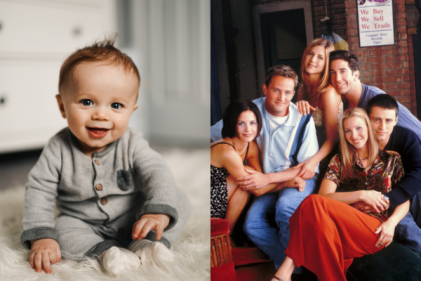When baby gets fussy and bored, it is easy to give in to temptation and just park baby in front of the telly and let it work its magic. Babies of all ages are mesmerized by the motion, colours and sounds coming from the large screen. So resist the temptation, spend a little creative time with them and you'll both benefit from the experience!
How do you entertain and infant from birth to about three months old? You get in touch with the senses; touch, sight (but remember that babies at this stage are near-sighted), smell and hearing. Leave the sense of taste until they are older. Sounds, smells, patterns and bright colours will keep them entertained for hours.
Try putting on some music and dance with baby in your arms. Or sit in your favourite rocking chair and sings songs or read a nursery rhymes to them. Babies like to look at colourful things. Show them large colourful picture books. Don't worry about baby “getting” the story.
Take out some of those bright and tactile clothing that you have stashed in the closet. Babies love the feeling of cashmere. Let them feel the fuzzy softness. They also like to look at things that are beaded or embroidered (ensure no beading or embroidery is loose). Tie colourful scarves, ribbons or fabrics to a wooden spoon and let them dangle in front of baby. Or tie an elastic string to a small toy and bounce it in front of baby. But remember safety first. Never leave a baby unattended with strings, ribbons, or scarves that could become wrapped around their neck, or that could get into their mouth.
Sing at the top of your lungs. Baby doesn't care if you're not an opera singer or have the world's worst voice. Babies love songs with animation. Some classics every parent should know are: “Itsy Bitsy Spider,” “The Wheels on the Bus,” “Row, Row, Row Your Boat,” “Head and Shoulders, Knees and Toes,” and the all time favourite, “Patty-Cake”. Also try songs with silly sounds or animal noises in them and use a hand puppet made from a napkin or a sock to put some action into the songs.
From four to six months babies become more active, learn how to roll over and may even sit up. This is the age where babies will spend a great deal of time holding, handling and putting objects into their mouths. Play time becomes more physical. They make lots of noises and have eye contact with you. Babies develop a sense of anticipation around this age. They giggle and gurgle with enthusiasm if you come at them with the game of “I am coming to get you” with hugs, kisses or tickles. They also enjoy a game of “this Little Piggy”.
This is a good time to engage the sense of smell and introduce the baby to the kitchen spice rack, to the fascinating smells of cinnamon, vanilla, peppermint, cloves and nutmeg. Allow them to smell other intriguing fragrances such as Dad's after shave, Mom's perfume and hand cream, being careful not to let them put it in their mouth.
Every baby (and most adults) loves bubbles. There's just something magical about them. Bubbles are incredibly inexpensive, easy to take with you, and provide hours of endless fun. Try blowing a few in a park and watch older children come and play with the bubbles. Your baby will love all the extra activity and company.
Take her with you when you go shopping. All the activity, the people, and new objects to look at provide stimulation and you can do the shopping too. On a trip out, why not purchase some blocks? You can find them in all shapes, colours and textures. Wooden spoons, small pots and pans also make excellent toys.
Go for a stroll, and not just to the park. Take a walk through a new neighbourhood. Allow your baby to experience nature. Talk to her during the stroll, engage them in their surroundings. Even a stroll through a local market can be entertaining for your baby.
How do you entertain and infant from birth to about three months old? You get in touch with the senses; touch, sight (but remember that babies at this stage are near-sighted), smell and hearing. Leave the sense of taste until they are older. Sounds, smells, patterns and bright colours will keep them entertained for hours.
Try putting on some music and dance with baby in your arms. Or sit in your favourite rocking chair and sings songs or read a nursery rhymes to them. Babies like to look at colourful things. Show them large colourful picture books. Don't worry about baby “getting” the story.
Take out some of those bright and tactile clothing that you have stashed in the closet. Babies love the feeling of cashmere. Let them feel the fuzzy softness. They also like to look at things that are beaded or embroidered (ensure no beading or embroidery is loose). Tie colourful scarves, ribbons or fabrics to a wooden spoon and let them dangle in front of baby. Or tie an elastic string to a small toy and bounce it in front of baby. But remember safety first. Never leave a baby unattended with strings, ribbons, or scarves that could become wrapped around their neck, or that could get into their mouth.
Sing at the top of your lungs. Baby doesn't care if you're not an opera singer or have the world's worst voice. Babies love songs with animation. Some classics every parent should know are: “Itsy Bitsy Spider,” “The Wheels on the Bus,” “Row, Row, Row Your Boat,” “Head and Shoulders, Knees and Toes,” and the all time favourite, “Patty-Cake”. Also try songs with silly sounds or animal noises in them and use a hand puppet made from a napkin or a sock to put some action into the songs.
From four to six months babies become more active, learn how to roll over and may even sit up. This is the age where babies will spend a great deal of time holding, handling and putting objects into their mouths. Play time becomes more physical. They make lots of noises and have eye contact with you. Babies develop a sense of anticipation around this age. They giggle and gurgle with enthusiasm if you come at them with the game of “I am coming to get you” with hugs, kisses or tickles. They also enjoy a game of “this Little Piggy”.
This is a good time to engage the sense of smell and introduce the baby to the kitchen spice rack, to the fascinating smells of cinnamon, vanilla, peppermint, cloves and nutmeg. Allow them to smell other intriguing fragrances such as Dad's after shave, Mom's perfume and hand cream, being careful not to let them put it in their mouth.
Every baby (and most adults) loves bubbles. There's just something magical about them. Bubbles are incredibly inexpensive, easy to take with you, and provide hours of endless fun. Try blowing a few in a park and watch older children come and play with the bubbles. Your baby will love all the extra activity and company.
Take her with you when you go shopping. All the activity, the people, and new objects to look at provide stimulation and you can do the shopping too. On a trip out, why not purchase some blocks? You can find them in all shapes, colours and textures. Wooden spoons, small pots and pans also make excellent toys.
Go for a stroll, and not just to the park. Take a walk through a new neighbourhood. Allow your baby to experience nature. Talk to her during the stroll, engage them in their surroundings. Even a stroll through a local market can be entertaining for your baby.











